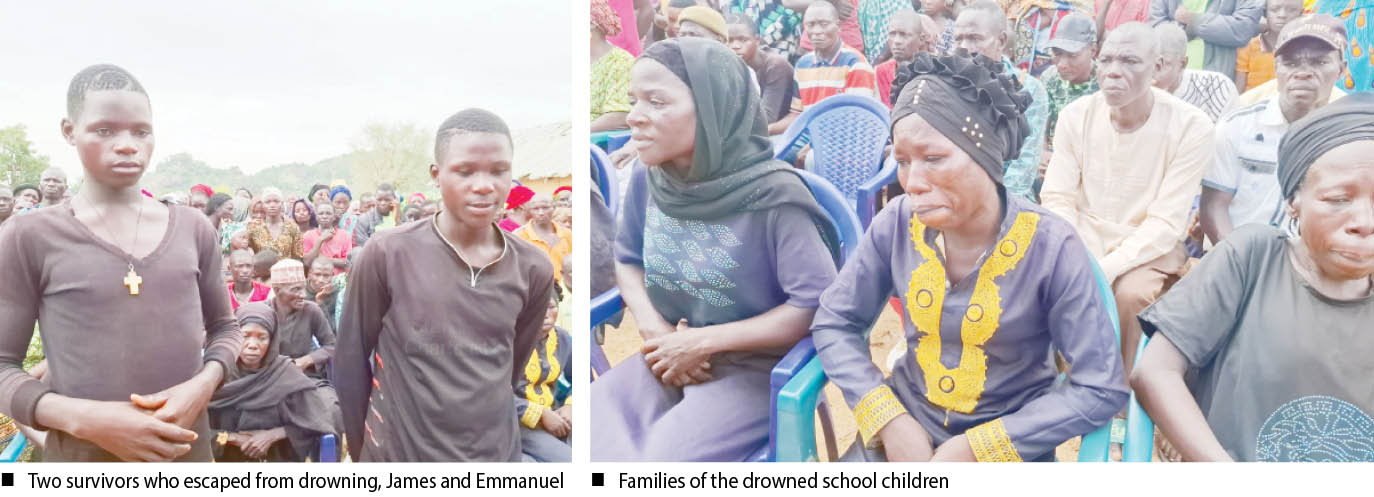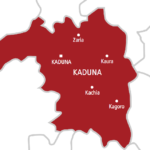Almost two weeks since the tragic drowning of six school children in Ribang community, Chawai Chiefdom, Kauru LGA of Kaduna State, the sorrow in the air is palpable. In the quiet village of Ribang, life has come to almost a standstill as families mourn the loss of their young ones who were swept away by the treacherous waters of River Kaduna.
It was an ordinary Tuesday afternoon when the children went to write their exams with dreams of their future hopes looming large, but not knowing they were, in fact, bidding farewell to their parents, friends and relatives. The weather was calm, and the sky was clear, giving no indication of the impending tragedy. However, a sudden surge in the river’s current, likely due to heavy rains upstream, caught them off guard.
The victims, identified as Manasseh Monday (16), Musa John (16), Pius David (15), Monday Ayuba (16), David Danlami (19), and Yahuza Audu (16), were students of Government Secondary School, Fadan Chawai.
Families, survivors, elders and other stakeholders who spoke to our correspondent when he visited the community, said the tragedy happened because of high tide following a heavy rainfall.
- Former gov, ministers, other looters sponsoring protests against us – EFCC
- Queues resurface as NNPC incurs $6bn petrol payment backlogs
“All the six victims could swim but drowned because River Kiteriya was at high tide following a downpour,’’ Comrade Simon Ishaku Chinge said.
Among the survivors were Joshua and Emmanuel, who shared their harrowing experiences with Daily Trust.
Joshua, a 16-year-old student, recounted the chaotic moments when the boat capsized. “It all happened so fast. One moment, we were laughing and talking about the exams, and the next, we were in the water, struggling to stay afloat. I remember clinging to a piece of wood, but then everything went dark,” he said.
Joshua was found unconscious on the riverbank by rescuers who pulled him to safety.
“When I woke up, I was surrounded by people, and I couldn’t believe I was alive. I’m grateful to God and those who saved me,” he added, his voice trembling with emotion.
Emmanuel James, another survivor, shared a similar experience. “We tried to hold on to each other, but the water was too strong. I don’t remember much after that; I must have blacked out,” he said. Emmanuel was also found unconscious on the riverbank, his motionless body carried by the current to safety. “I woke up in the hospital, and they told me I had been rescued. It’s a miracle that I’m here today. I lost friends, but I’m thankful for the second chance at life,” he said.
Their stories of survival amidst the tragedy provided a glimmer of hope for the grieving community, highlighting the bravery of the rescuers and the resilience of the human spirit in the face of overwhelming adversity.
Daily Trust gathered that on that day at about 9:30am, a total of eight students went to cross the river after their JSCE examinations. About midway into the journey, a strong wave surged through the surface of the waters, causing panic among the students.
“We all started shouting for help as we held firmly to each other,” said James, one of the survivors who narrated his ordeal to our reporter.
Four corpses were found floating at the bank of the river on the fateful day, one was found the following day in a village near Mariri town of neighbouring Lere LGA and one is still missing.
Some, who spoke with our reporter at their homes in Ribang, said they were too traumatised to recount their experiences.
The mother of one of the victims, Mama David Danlami, said her 19-year-old son, who also attended the exams, died in the incident.
“My son was a very hardworking and obedient person. We are very devastated,” she said.
She tearfully recounted the heart-wrenching moment she saw her son drowning in the river. “Immediately after we learned that the children were drowning, I rushed to the river to see what was happening. When I arrived, I saw all the children desperately looking for help, but nobody could enter the river due to its dangerous state,” she said.
“I tried to risk my life as I saw my child crying for help, but people around me held me back. I saw my son and the other children shouting, their voices filled with fear and despair, as they gave up. They were telling us to pray and forgive their shortcomings,” she said, tears streaming down her face. “It was the most helpless feeling in the world, watching my son and the others as the river washed them away.”
Suzie John, a heartbroken grandmother, recounted the tragic day her grandson Musa lost his life in the river. She said, Musa whom she described as a diligent student, had been attending his exams with his friends.
“On that fateful day, I reminded Musa not to cross the river if it rains. He assured me he would not.
“After their exams, Musa and his friends reached the river. It had rained earlier, and the water level was high. Musa told his friends about my warning. He hesitated, but when he saw his friends attempting to cross, he decided to follow them.
“The river surged, and they struggled against the current. Someone told Musa to drop his bag, and he did. But it was too late. The water was too strong, and it swept them away before I could reach them.
“My Musa is gone, and my heart aches with his loss.” She pleaded with the authorities to construct a bridge and build hospital in the community as they have to go to neighbouring Plateau State whenever they have an emergency.
A village elder, Solomon Bonsong, highlighted the community’s collective pain. “We are a small, tightly-knit community. The loss of these children is felt by everyone. They were all our own children,” he said.
He called on the government to urgently construct a bridge, hospital and a secondary school in the village.
The Dakaci Garba Madaki, the Village Head of Ribang, described the mishap as a monumental disaster, which was the first of its kind in Ribang. Madaki. He has been receiving scores of sympathisers following the incident, and noted that it was an act of God which cannot be questioned by mortals.
“It is quite painful, especially for the families of the bereaved; more so that the deceased were children between the ages of 12 and 13 years. But we take solace in the fact that death is a necessary end,” he said
He emphasized the need for proactive measures. “We cannot bring back the children we lost, but we can take steps to ensure this never happens again,” he said.
Mukhtar Zakari, the member representing the area in the House of Representatives, was also there on a condolence visit on Saturday. He described the incident as “shocking,” and also emphasised the need for improved infrastructure to prevent such tragedies in the future.
He promised to collaborate with the state governor, state House of Assembly member, and the council chairman of the local government to bring succour to the community.
Barnabas Haruna Danmaigona, member representing Kauru in the Kaduna State House of Assembly, also paid a condolence visit to the bereaved families. He called on the state government to provide the people with modern speed engine boats as alternatives to the locally constructed canoes to reduce the risk of such mishaps.
Bashir Dawaki, the Chairman of Kauru LGC, who hosted the visiting dignitaries, in his address, called for collective efforts to support the affected families and improve the community’s safety measures.
Chief Abel Adamu, the President of Chawai Development Association, also expressed his condolences and urged the community to stay strong in the face of such a monumental tragedy. He also conveyed the condolences of the Southern Kaduna Leadership Forum.

 Join Daily Trust WhatsApp Community For Quick Access To News and Happenings Around You.
Join Daily Trust WhatsApp Community For Quick Access To News and Happenings Around You.

